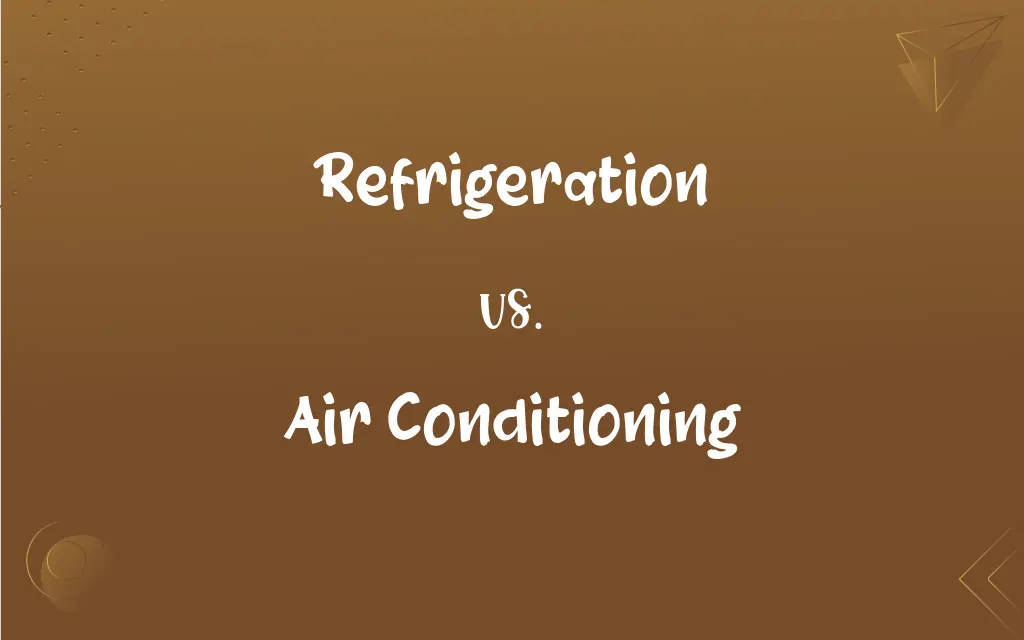Refrigeration vs. Air Conditioning: What's the Difference?
Edited by Janet White || By Harlon Moss || Updated on October 17, 2023
Refrigeration is the process of removing heat to preserve substances, while air conditioning controls the temperature and humidity of an environment for comfort.

Key Differences
Refrigeration and air conditioning are technologies that manipulate temperatures, but their primary functions and applications differ. Refrigeration is fundamentally concerned with the storage and preservation of items, typically food or medical supplies.
Refrigeration operates by removing heat from a space or substance to lower its temperature below that of its surroundings. This process prevents the growth of harmful bacteria and prolongs the shelf life of perishables. In contrast, air conditioning not only cools a space but also controls humidity, making environments comfortable for occupants.
While both refrigeration and air conditioning systems use similar principles of the vapor-compression cycle to remove heat, their design and components are tailored to their specific needs. Refrigeration units are usually more robust, ensuring that the temperature remains at a consistent low. Meanwhile, air conditioning systems are designed to cycle on and off to maintain a desired room temperature.
Many commercial and industrial sectors rely heavily on refrigeration for various purposes, from food storage in supermarkets to preserving medical supplies in hospitals. On the other hand, air conditioning is predominantly used in residential, commercial, and transportation settings to provide comfort by moderating temperature and humidity.
It's important to note that while refrigeration primarily focuses on cooling, air conditioning can offer both cooling and heating options. Some air conditioning units come equipped with heat pumps that can reverse the cooling process, providing warmth in colder months.
ADVERTISEMENT
Comparison Chart
Primary Function
Preserving substances
Regulating temperature and humidity for comfort
Application
Food storage, medical supplies
Homes, offices, vehicles
Temperature Consistency
Typically consistent low temperatures
Cycles to maintain desired room temperature
Humidity Control
Not primary concern
Actively controls humidity
Heating Option
Rarely
Often, especially in units with heat pumps
ADVERTISEMENT
Refrigeration and Air Conditioning Definitions
Refrigeration
The process of cooling an environment or substance below ambient temperature.
Thanks to refrigeration, we can preserve food for longer periods.
Air Conditioning
Systems used in vehicles, homes, and offices to moderate internal climates.
Driving in summer without air conditioning can be quite uncomfortable.
Refrigeration
A technology used to slow down the bacterial growth in perishables.
Modern medicine benefits significantly from refrigeration.
Air Conditioning
The process of treating air to meet specific temperature and moisture conditions.
The building's air conditioning keeps employees comfortable during work.
Refrigeration
A system designed to maintain low temperatures in a specific space.
Supermarkets require efficient refrigeration systems for their produce sections.
Air Conditioning
A technology that can cool or heat indoor spaces.
Many homes are equipped with air conditioning for year-round comfort.
Refrigeration
The act of removing heat through mechanical means.
Without refrigeration, many products would spoil rapidly.
Air Conditioning
A method to enhance indoor air quality and comfort.
With air conditioning, even the hottest days are bearable indoors.
Refrigeration
A method to prolong the shelf life of products.
Refrigeration has revolutionized the way we store food.
Air Conditioning
A system designed to control the temperature and humidity of an environment.
In hot summers, air conditioning is a lifesaver.
Refrigeration
To cool or chill (a substance).
Refrigeration
To preserve (food) by chilling.
FAQs
Can refrigeration systems heat a space?
Typically, refrigeration focuses on cooling, not heating.
Are there air conditioning systems that also heat?
Yes, many air conditioning systems have heat pumps for heating.
Why is refrigeration vital in the food industry?
Refrigeration prevents bacterial growth, keeping food safe and fresh.
How does air conditioning affect humidity?
Air conditioning regulates both temperature and humidity for comfort.
How does air conditioning contribute to comfort?
Air conditioning moderates temperature and humidity, enhancing comfort.
Can refrigeration work without electricity?
Most modern refrigeration systems require electricity, but there are non-electric methods like iceboxes.
Can air conditioning spread illnesses?
If not maintained, it can spread contaminants, but proper filtration reduces risks.
What products besides food need refrigeration?
Medical supplies, chemicals, and certain electronics require refrigeration.
What's the principle behind refrigeration?
It works on the vapor-compression cycle, removing heat from a space.
What's the environmental impact of air conditioning?
Air conditioning uses energy and refrigerants, which can have environmental effects.
Are there eco-friendly air conditioning options?
Yes, there are energy-efficient units and those using eco-friendly refrigerants.
How often should air conditioning systems be serviced?
Regularly, usually once a year, to ensure efficiency and longevity.
How have air conditioning designs evolved?
From bulky units to sleek, smart, and energy-efficient systems.
What's the main goal of refrigeration?
Refrigeration aims to preserve and prolong the shelf life of products.
Do all air conditioning units have a heating function?
Not all; only those with heat pumps can also heat spaces.
Is air conditioning common worldwide?
While prevalent in many countries, its usage varies based on climate and economic factors.
Can refrigeration systems cool large industrial spaces?
Yes, industrial refrigeration can cool vast spaces like warehouses.
How has refrigeration improved health outcomes?
It preserves medicines and vaccines, enhancing their effectiveness.
How has refrigeration impacted global trade?
Refrigeration allows for longer transportation of perishables, expanding global trade.
What's the future of refrigeration technology?
Trends include energy efficiency, eco-friendly refrigerants, and smart systems.
About Author
Written by
Harlon MossHarlon is a seasoned quality moderator and accomplished content writer for Difference Wiki. An alumnus of the prestigious University of California, he earned his degree in Computer Science. Leveraging his academic background, Harlon brings a meticulous and informed perspective to his work, ensuring content accuracy and excellence.
Edited by
Janet WhiteJanet White has been an esteemed writer and blogger for Difference Wiki. Holding a Master's degree in Science and Medical Journalism from the prestigious Boston University, she has consistently demonstrated her expertise and passion for her field. When she's not immersed in her work, Janet relishes her time exercising, delving into a good book, and cherishing moments with friends and family.































































